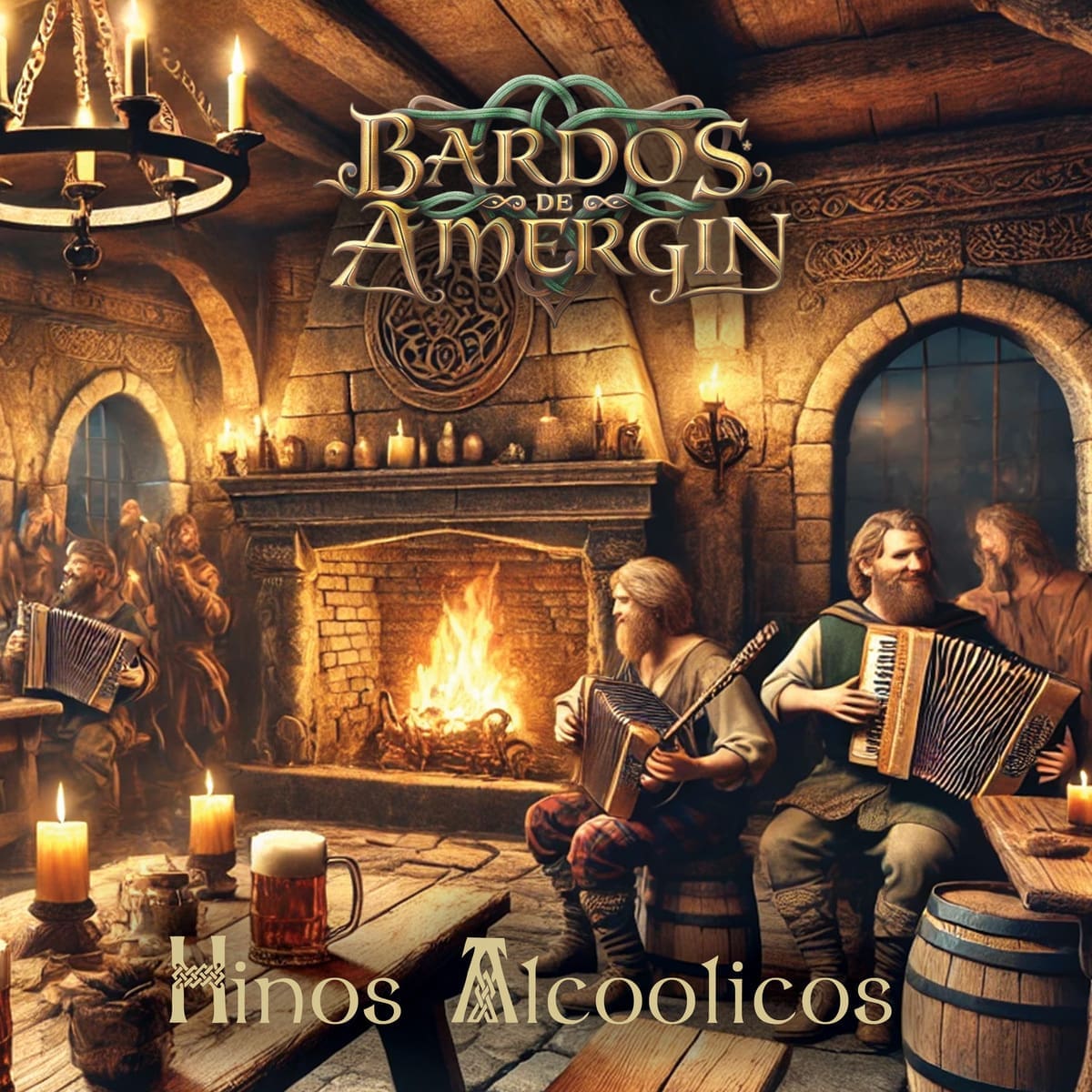Bardos De Amergin — Hinos Alcoólicos Review
On March 9, 2025, the Portuguese multi-instrumentalist Melkor uncorked Hinos Alcoólicos, a solo ritual released through Studio 13. Under the banner of Bardos De Amergin, this Extreme Folk Metal project channels the chaotic beauty of storytelling under the influence—where myth, mead, and metal converge.
Bardos De Amergin, Hinos Alcoólicos Review: This review will evaluate every aspect of the album, from its intricate musical composition to its production. Our analysis will provide valuable insights to help you determine if this album is worth adding to your collection.

The First Three Sins, The Summary
The Fourth Sin, Overall Discussion
Opening Invocation: Press Play, Enter the Ritual
The moment the listener presses that play button, the album’s journey begins. The opening hymn, Hino das Canecas, immediately transports you. It conjures a medieval atmosphere. This segues into a folkish extreme metal anthem.
The Alcohol Hymns: Storytelling Under the Influence
Listeners then continue their merry way with the remaining six alcohol hymns, and discovering “Hinos Alcoólicos” is a celebration of ancient drinking songs and the timeless bond between music and revelry. Inspired by myth, folklore, and the spirit of camaraderie, Bardos de Amergin bring forth a collection of anthems that echos through feasts, taverns, and sacred gatherings. With powerful melodies and tales soaked in ale and mead, this album is an invitation to raise your cup and sing along to the rhythms of the past. “The raw energy and unpredictable nature of storytelling under the influence of alcohol—a mix of lighthearted revelry and tragic myth.” [Bardos De Amergin]
Each track is a ceremonial hymn, blending folk instrumentation with metal intensity, invoking the spirit of Dionysian celebration and bardic storytelling. Lyrics are steeped in Celtic ritual, drunken myth, and exaggerated tales told by firelight.
Solo Devilmanship: Melkor’s Ritual Craft
The entire Bardos De Amergin project is the conjuration of a single visionary. This solo artist is known as Melkor. He is solely responsible for its “devilmanship.” Melkor composes, performs, and produces every single track himself. This immense undertaking includes spans every instrument, music composition, lyric writing, recording sessions, mixing, and mastering. He even handles all the vocals. This solo ritual imbues the album with a deeply personal feel. It is truly a handcrafted (fruit of art) work. It feels like a lone bard whispering ancient tales by a crackling firelight. Pedro Raimundo makes a guest appearance. He adds a touch of spectral shimmer on keyboards. His melodic counterpoint weaves through the heavier instrumentation.
Tavern Alchemy: Where Folk Ritual Meets Metal Fury
Bardos De Amergin offers a unique folk metal fusion. It masterfully blends traditional folk motifs. These are layered with powerful heavy metal textures. Imagine acoustic strums intermingling with heavily distorted guitar riffs. Warlike drums provide a relentless pulse. Mythic chants rise above it all. Hymns such as Taverna dos Druidas and Círculo da Cerveja are particularly evocative. They transport you to smoky, communal drinking spaces. You can almost hear the clinking of tankards. You can feel the stomping of boots on wooden floors. The album expertly captures this authentic tavern ambience.
The album moves from the thunderous power of Whisky nas veias. It shifts to the more introspective melodies of Ode ao Vinho. This dynamic range mirrors the emotional arc of a night spent drinking. It oscillates between intense revelry and quiet introspection.
The production itself is described as a “solo distillation.” Melkor is both the brewer and the bard. The sound is a ritualistic exploration of contrast. It plays with light and shadow. It navigates between clarity and controlled chaos, where Melkor acts as both brewer and bard. The sound itself is a ritual of contrast—light and shadow, clarity and chaos.

Battle Riffs and Bardic Whispers: The Stringed Backbone
The stringed instruments form the backbone of the sound. Electric guitars provide the core riff engine. They are distorted, crunchy, and often gallop with furious energy. These guitars are employed for the album’s battle hymns and energetic tavern anthems. Acoustic guitars are used for the gentler folk intros. They feature in bardic interludes and provide melodic transitions. These acoustic elements add warmth and a rich storytelling texture. The bass guitar offers a deep, rumbling foundation. It typically mimics a heartbeat or a ritualistic pulse beneath the sonic chaos.
Hymns like Whisky nas veias and Círculo da Cerveja showcase layered guitar harmonies. These harmonies evoke both boisterous revelry and a touch of melancholy.
Rhythmic Rites and Bardic Voices: The Pulse of the Ceremony
Percussion is equally dynamic. The drum kit, whether digital or live, creates a thunderous backbone. It delivers blast beats, warlike rhythms, and infectious tavern stomps. Speculative percussion elements include the frame drum or Bodhrán. This adds a distinct folk resonance. It is likely used in intros or ambient passages. It simulates ancient rites and ceremonies. The vocals are presented in three distinct layers. Lead vocals deliver gruff storytelling. They provide ceremonial invocations. Bardic chants are a key feature. Layered harmonies simulate communal drinking songs. They create echoes of a lively tavern chorus. Spoken word and growls are used for dramatic emphasis. They add a layer of mythic narration.
Solo Distillation: Brewer and Bard
Additional sonic elements are likely employed. These would deepen the immersive experience. Ambient effects such as crackling fire sounds or the clinking of mugs are probable. The sound of wind through trees might also feature. MIDI orchestration could add cinematic weight. This would be especially effective in tracks like Ode ao Vinho and Taverna dos Druidas. Reverb and delay effects would be used. They would simulate cavernous taverns and grand, echoing bardic halls.
This is a manifestation of “bardic possession.” Melkor conjures a full ceremonial ensemble from within himself. Each instrument becomes a vessel for his artistic vision. The guitars act as swords. The drums become war cries. Synthesizers evoke swirling mist. The vocals serve as powerful invocations.
Final Invocation: Raise Your Tankard/Viking Horn
Bardos De Amergin is a must-listen release. It is for fans of extreme metal and folk metal alike. This thirty-minute folk-anthem is a fruit of art. It delivers speed, fun, and catchiness. It is heavy and aggressive. The lyrics are sung in Portuguese, adding to its authentic charm.
As the Album Reaches Its Last Sip
As Hinos Alcoólicos reaches its final, mead-soaked moments, we raise our tankards in gratitude to Bardos De Amergin / Melkor for entrusting us with this review. His solo devilmanship has conjured a ritual worth chronicling. Now, we conclude by invoking the final three sins—those that shape the album’s legacy beyond sound.
The Fifth Sin, The Memorabilia
For us, where I begin is always with “Melkor”—a name that’s never let me down, whether in devilmanship or music. Every project delivered is a fruit of art. But Bardos De Amergin? Melkor’s name alone carries mythic weight, but Bardos De Amergin was a first-time rite—and what a collision it was. Extreme folk metal meets Dungeons & Dragons fantasy, with enough charm to win over even Gamma, our review-sidekick. This is a project that lingers, not just in sound, but in spirit.
The Sixth Sin, The Artwork
The album’s visual invocation mirrors its sonic ritual: rustic, chaotic, and steeped in folklore. It evokes the clinking of tankards and the flicker of firelight—an emblem of Dionysian revelry.
The Seventh Sin, Disrelish
There is none. Hinos Alcoólicos delivers on every front—musically, thematically, and ceremonially. It’s a handcrafted offering that honours both its genre and its mythic intent. Thank you for joining us in this rite. Thus, we conclude our review of Bardos De Amergin‘s Hinos Alcoólicos. We invite you to explore Melkor’s work further, and to let Hinos Alcoólicos echo through your own sacred gatherings. Let the hymns live on.
The Hymns
01. Hino das Canecas
02. Whiskey nas veias
03. Taverna dos Druidas
04. Bebida dos Deuses
05. Círculo da Cerveja
06. Dança do Barril
07. Ode ao Vinho
Bardos De Anergin
All music, lyrics, recording, mixing, mastering, and vocals by Melkor
Pedro Raimundo — Keyboards